Basic Information
Program Name
Richmond’s Eviction Diversion program
Short Description
Richmond’s Eviction Diversion program provides tenants who have received an unlawful detainer (and satisfy other eligibility criteria) with the opportunity (if their landlord agrees) to enter a voluntary conciliation procedure and to receive financial literacy education and financial assistance, as opposed to going through the court eviction process.
It helps tenants pay overdue rents, set up a payment plan if the landlord agrees, and provides families with links to government and nonprofit resources.
Location
Richmond, Virginia
Duration
October 1, 2019 – June 30, 2020, and beyond if funding continues
*Starting September 10, 2019, an information sheet about the program was attached to all unlawful detainers.
Funding
$485,000, including $300,000-$350,000 for tenant assistance as part of payment plans.
Size (number of beneficiaries)
The program receives 30-55 calls/day.
76 households from October 1, 2019 through December 31, 2019
Stakeholders
Who designed and set up the program?
The program was designed and pushed forward by Central Virginia Legal Aid Society (CVLAS), Housing Opportunities Made Equal (HOME), and the city of Richmond.
Who runs and manages the program?
The program is run by HOME, Greater Richmond Bar Foundation (GRBF), Richmond Firms in Service (FIS), and the city of Richmond.
Who funds the program? How much funding has been received, and what is the sustainability plan for the funding?
The city of Richmond has provided $485,000 in non-departmental funding.
Intended Beneficiaries: Who does the program target?
The program is open to tenants renting in the city of Richmond who have received an unlawful detainer but before a judgment of possession (court order) has been issued. Nonpayment of rent must be the only issue and the landlord and tenant must agree on amount due as of the court date.
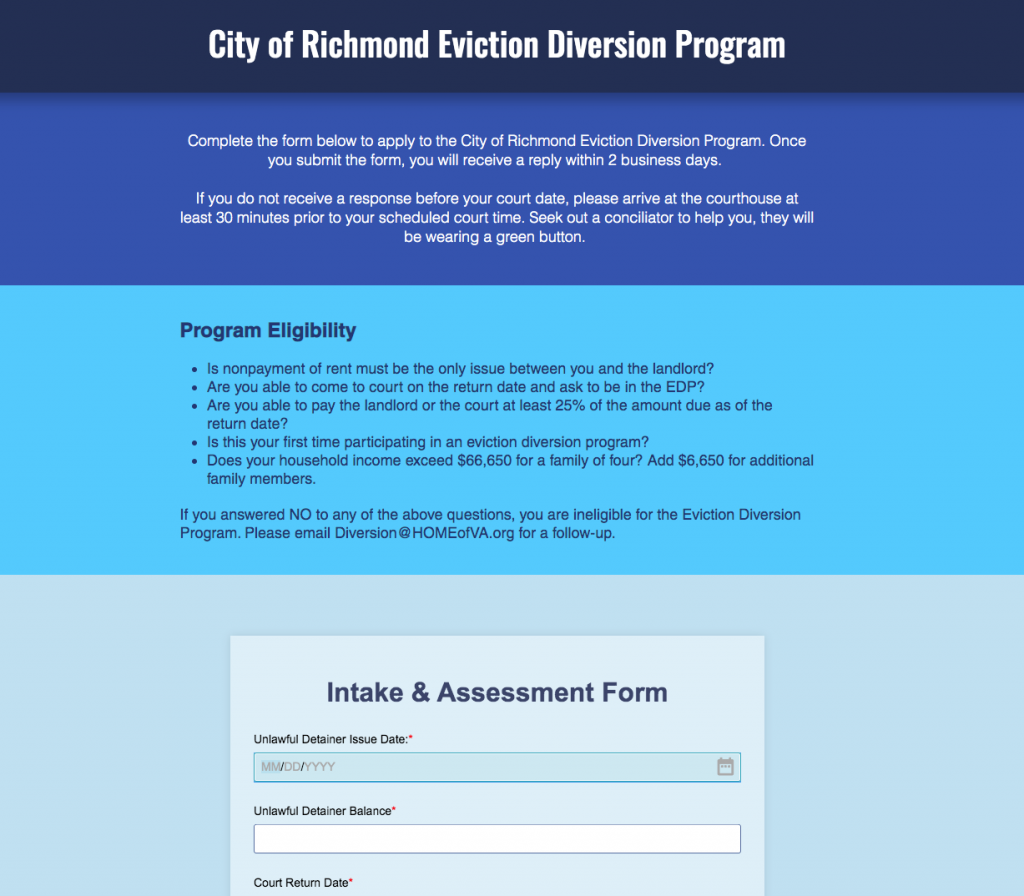
Program Details
How does the program work? What are the typical paths of action that the beneficiary + the service-provider take?
Since October 1, 2019, a voluntary Eviction Diversion Program has been operating in the City of Richmond General District Court. The program is available to tenants renting in the City of Richmond after an eviction lawsuit has been filed against the tenant, and before a court order has been made in that lawsuit. Nonpayment of rent has to be the sole issue between the landlord and the tenant, and they must agree on the total amount due as of the court date.
To take part in the Eviction Diversion Program, the tenant must come to court on the court date and pay 25 percent of the amount due. The tenant must explain the reason for falling behind in rent, be able to pay ongoing rent when due, and be able to catch up on the back rent. The tenant also must have a good rent paying record. This means four things. The tenant has not been late more than three times in the past twelve months. During that 12 months, the tenant has not been late more than two times in a six month period. The tenant has not had an eviction lawsuit dismissed by paying current in the last six months. Also, the tenant has not been in an Eviction Diversion Program in the past 12 months.
Here is the process as a step-by-step:
- An information sheet about the program is attached to all unlawful detainers. (See below for the sheet — which is printed on green paper).
- The info sheet has sign-up information. Tenants interested in the program should apply online as soon as possible by going to RVAevictions.org. Tenants without internet access may call 833-663-8428, press 4, and leave a message.
- After leaving a message or filling in the website form, the tenant receives a return call within 24-48 hours during which HOME conducts an eligibility screening.
- HOME refers potential candidates to the GRBF.
- The GRBF provides conciliators. Conciliators are volunteers who have registered for the JusticeServer and selected GRBF as a “Preferred Legal Service Organization.” After their registration is approved, volunteers can register for shifts by clicking “Volunteer Opportunities.” One (or more) volunteers is responsible for all Eviction Diversion Program cases on a single court return date. Conciliator(s) for that date are provided with the relevant information obtained by HOME.
- Before the court date, the conciliator contacts the landlord to encourage and assist landlord and tenant to agree on a payment plan.
- On the court date, the tenant must come to court and
- Pay 25% of the amount due (by cash, certified funds, or money order),
- Explain why they fell behind on rent,
- Be able to pay ongoing rent when due and catch up on back rent,
- Have a good rent paying record (not late more than twice in a 6-month period and not more than three times in a 12-month period, not been in an eviction diversion program in the last 12 months, and not had an unlawful detainer dismissed in the last 6 months.)
To receive financial assistance, the tenant must additionally:
- After paying 25% of the amount due, have entered a payment plan and continuance agreement,
- Participate in a financial literacy counseling session,
- Bring to the session the payment plan and continuance agreement, proof of current income, bank statements, and proof of expenses,
- Have household income not in excess of 80% of Richmond’s median household income.
8. If the landlord agrees, the tenant and landlord sign a payment plan. Under the plan, the tenant pays ongoing rent when due.
9. According to the agreed on payment plan and continuance agreement, the tenant pays ongoing rent when due and makes three monthly payments of 25% of the amount due to catch up on the back rent. (The Eviction Diversion Program will make at least one, probably two, but probably not all three of these payments.)
10. When all payments are paid, the case is dismissed as paid, and there is no judgment of possession on the tenant’s record.
What assets can be shared for others to use?
The program can make available upon request:
- Information sheet attached to unlawful detainers,
- Voicemail script for toll-free number to call,
- Tenant screening questions,
- Volunteer conciliator instructions,
- Volunteer conciliator consent form,
- Payment plan and continuance agreement,
- Powerpoint with additional program details.
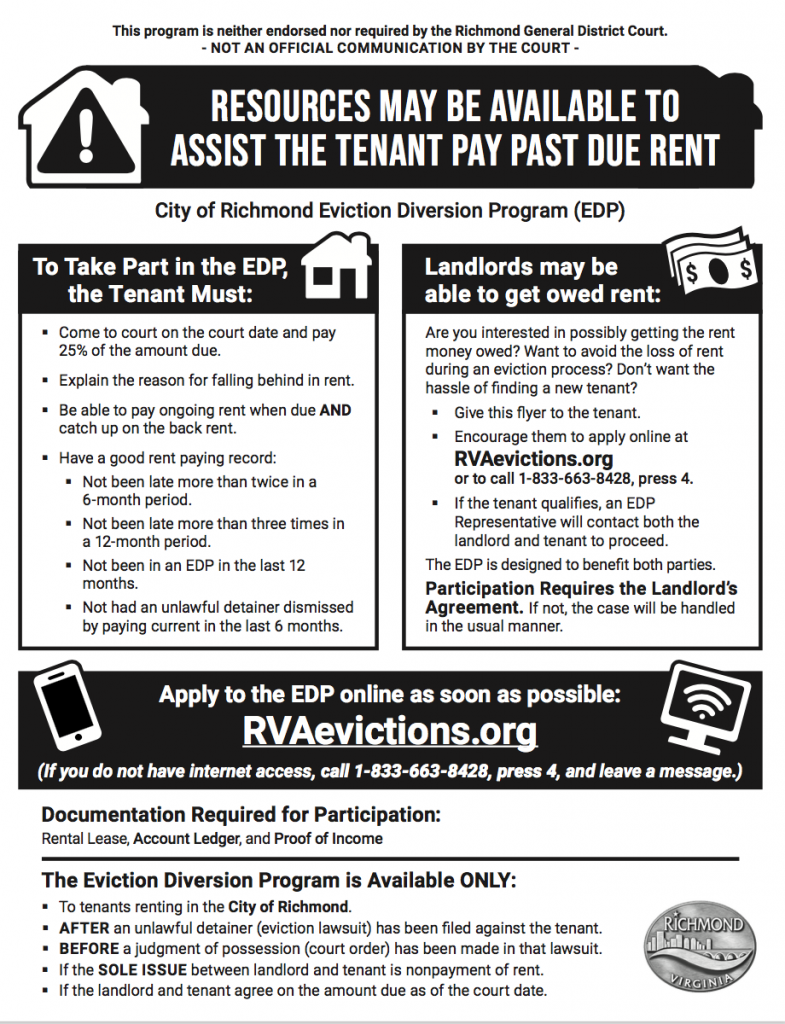
Evidence Base
What are the plans for monitoring and evaluation?
HOME is currently tracking all data related to the program, including all calls received, and, for clients who meet eligibility criteria, their progress over a six-month timeframe.
The goal is to divert 300-500 families in the program’s first year. After six months, HOME will provide a report on key indicators.
Have any evaluations been conducted so far?
No evaluations have been conducted so far.
Contact and Follow-Up Info
Program Website
The program has a litigant-facing website, for intake and assessment of people interested in participating in the program: https://www.rvaevictions.org/
Documentation + Links
See this presentation, http://www.richmondgov.com/PressSecretaryMayor/robocopy/documents/AddressingEvictionRVA.pdf
See media coverage:
http://richmondfreepress.com/news/2019/sep/06/home-begin-eviction-diversion-program/
Point of Contact for more information
Monica Jefferson, mjefferson@homeofva.org, and Martin Wegbreit, Director of Litigation – Central Virginia Legal Aid Society, at marty [@] cvlas.org
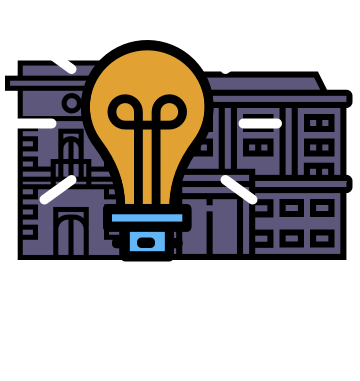
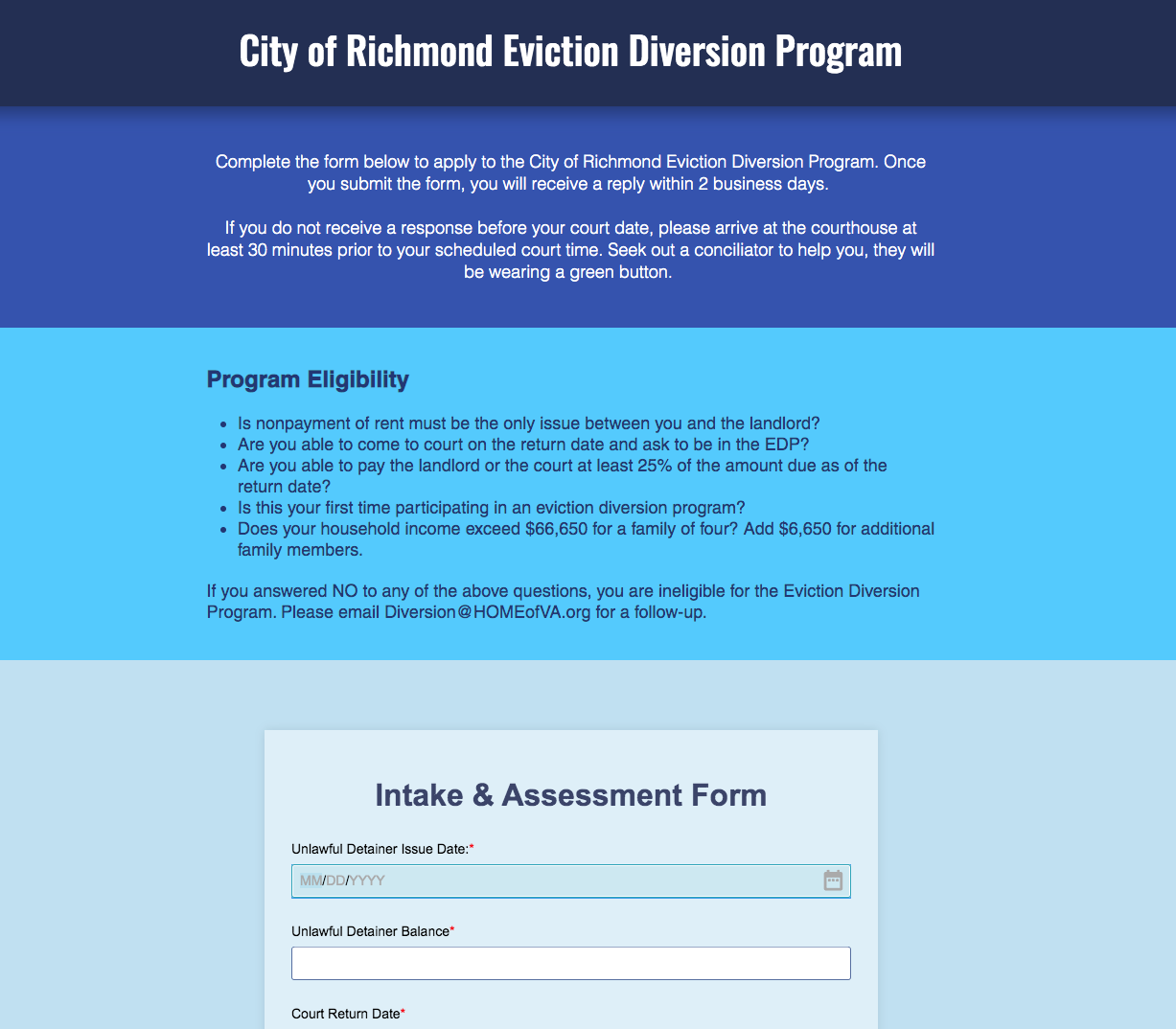
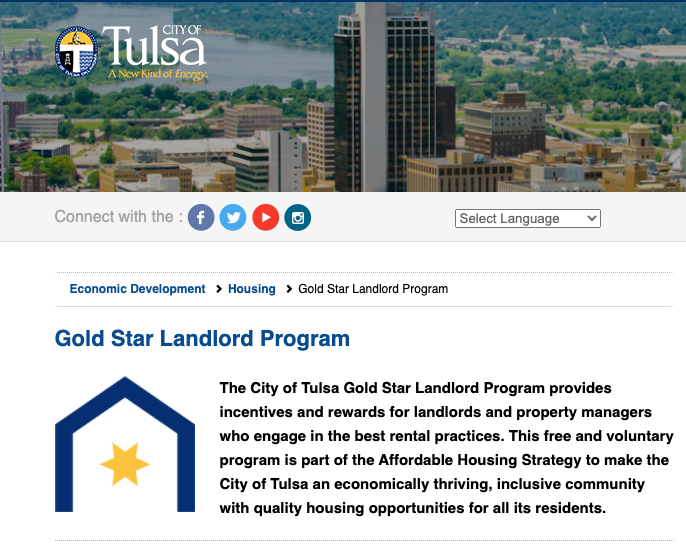
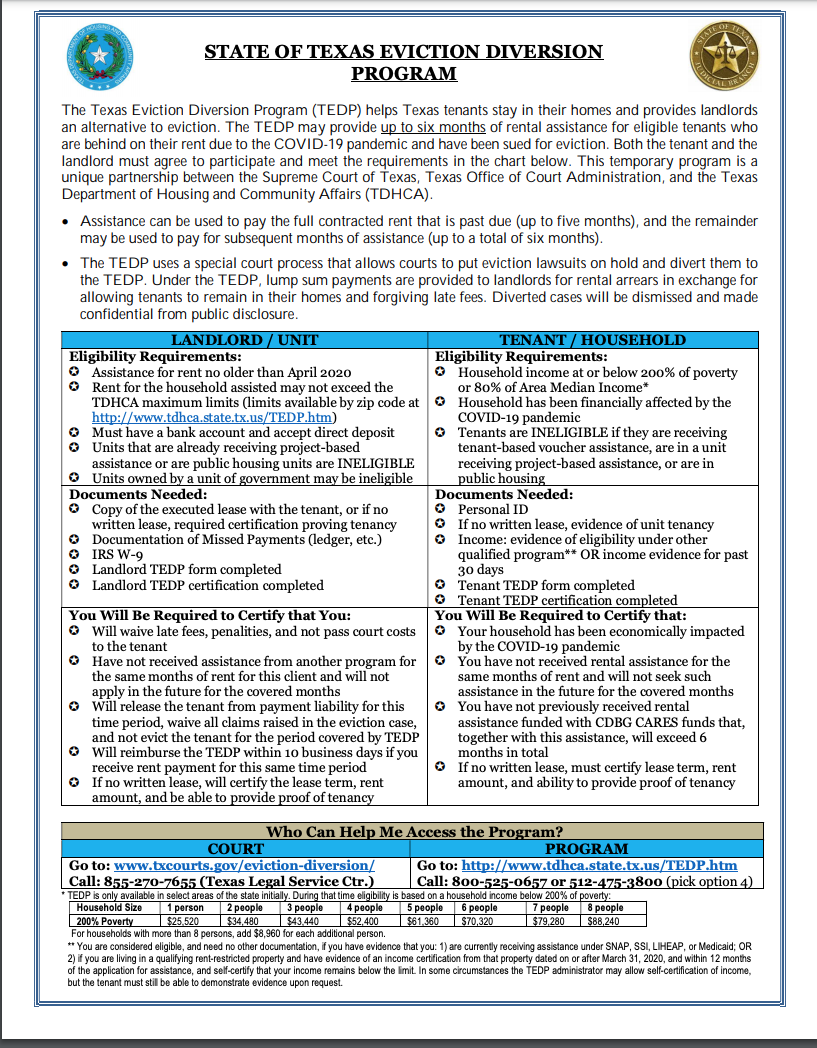
2 Comments
Please I need help for my rent before they eviction me on April 29
Hi, you can find services in Virginia that might be able to help: https://legalfaq.org/getHelp/va#financialAssistance